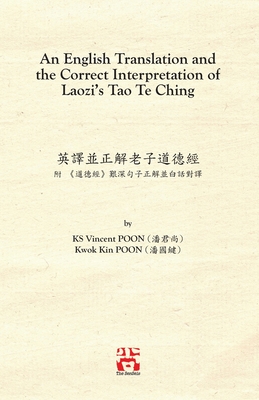An English Translation and the Correct Interpretation of Laozi's Tao Te Ching 英譯並正解老子道德

An English Translation and the Correct Interpretation of Laozi's Tao Te Ching 英譯並正解老子道德
(I)
Tao Te Ching (《道德經》, or Dao De Jing), presumably written by Laozi (老子) of the 6th century BC, is one of the most famous and influential philosophical works in Chinese history. Being the foundational canon of Taoism (道家), Tao Te Ching outlines the characteristics and roles of the fundamental Tao (道) and its Te (德, Manifestation of Tao) in the formation and maintenance of all in the Universe. Written in fewer than 6000 Chinese characters, Tao Te Ching also depicts the underlying nature of governance and some natural laws, which, remarkably, include modern scientific concepts such as atomic theory, chemical equilibrium, polarities, as well as the quantum uncertainty principle. Accordingly, despite its age of over 2500 years, Tao Te Ching remains a monumental text that must be read by all.
(II)
Unfortunately, Tao Te Ching is often misinterpreted by many for more than two thousand years. Their failures can largely be categorized into four types: Misinterpreting through the lenses of Taoist Religion (道教) and Huang-Lao (黄老) concepts. One typical example is erroneously taking Laozi had advised one to completely rid all desires to become a celestial being (神仙), which often leads to misinterpreting "鬼" as "ghosts" and "神" as "gods" or "dieties" in Tao Te Ching. Laozi had only asked one to minimize desires and had never addressed the existence of supernatural entities. Heshang Gong (河上公), one of the most prominent masters of Taoist Religion and the earliest commentators of Tao Te Ching, had often committed this type of error.Misinterpreting through the lenses of Confucianism. Thus, characters such as "仁", "慈", "善", "德" are often misinterpreted by applying Confucian values. Laozi abhorred the establishment of Confucian "moral virtues", and so he could not have cherished them in Tao Te Ching. As Confucianism is widespread among Chinese academia, this type of misinterpretation is frequently committed by many scholars, including the renowned Wang Bi (王弼), Kang Youwei (康有為), Zhang Mosheng (張默生), Gao Heng (高亨), and James Legge. Misinterpreting Chinese characters like "若", "似", and "或" as "seemingly", "resemble", and "perhaps". Such misinterpretations often give rise to the incorrect impr
Descrierea produsului
(I)
Tao Te Ching (《道德經》, or Dao De Jing), presumably written by Laozi (老子) of the 6th century BC, is one of the most famous and influential philosophical works in Chinese history. Being the foundational canon of Taoism (道家), Tao Te Ching outlines the characteristics and roles of the fundamental Tao (道) and its Te (德, Manifestation of Tao) in the formation and maintenance of all in the Universe. Written in fewer than 6000 Chinese characters, Tao Te Ching also depicts the underlying nature of governance and some natural laws, which, remarkably, include modern scientific concepts such as atomic theory, chemical equilibrium, polarities, as well as the quantum uncertainty principle. Accordingly, despite its age of over 2500 years, Tao Te Ching remains a monumental text that must be read by all.
(II)
Unfortunately, Tao Te Ching is often misinterpreted by many for more than two thousand years. Their failures can largely be categorized into four types: Misinterpreting through the lenses of Taoist Religion (道教) and Huang-Lao (黄老) concepts. One typical example is erroneously taking Laozi had advised one to completely rid all desires to become a celestial being (神仙), which often leads to misinterpreting "鬼" as "ghosts" and "神" as "gods" or "dieties" in Tao Te Ching. Laozi had only asked one to minimize desires and had never addressed the existence of supernatural entities. Heshang Gong (河上公), one of the most prominent masters of Taoist Religion and the earliest commentators of Tao Te Ching, had often committed this type of error.Misinterpreting through the lenses of Confucianism. Thus, characters such as "仁", "慈", "善", "德" are often misinterpreted by applying Confucian values. Laozi abhorred the establishment of Confucian "moral virtues", and so he could not have cherished them in Tao Te Ching. As Confucianism is widespread among Chinese academia, this type of misinterpretation is frequently committed by many scholars, including the renowned Wang Bi (王弼), Kang Youwei (康有為), Zhang Mosheng (張默生), Gao Heng (高亨), and James Legge. Misinterpreting Chinese characters like "若", "似", and "或" as "seemingly", "resemble", and "perhaps". Such misinterpretations often give rise to the incorrect impr
Detaliile produsului












